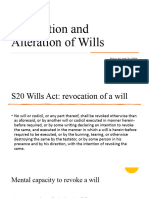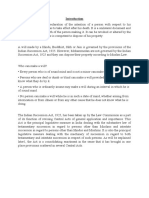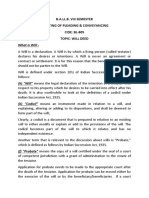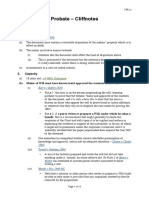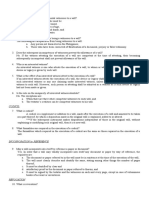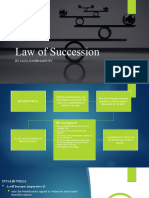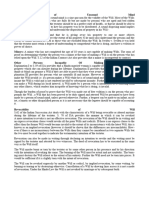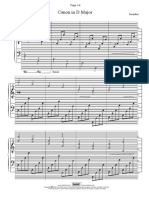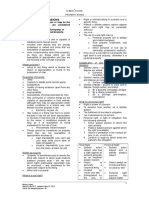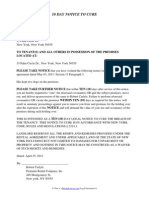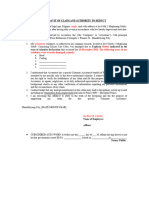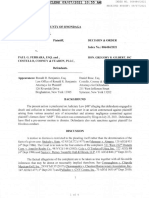Revocation and Alteration of Wills
1. Revocation of a will s20 Wills Act 1837
No will or codicil, or any part thereof, shall be revoked otherwise than as aforesaid, or by another
will or codicil executed in manner herein-before required, or by some writing declaring an intention
to revoke the same, and executed in the manner in which a will is herein-before required to be
executed, or by the burning, tearing, or otherwise destroying the same by the testator, or by some
person in his presence and by his direction, with the intention of revoking the same.
Several ways to revoke a will
2. Mental Capacity to revoke a will
Same test for mental capacity as for making a will – Banks v Goodfellow
3. Revocation by making a new will
Usual to include an express revocation clause
Where no revocation clause; new will revokes clauses which are inconsistent from the old one but
the old one remains valid for the rest of the clauses
4. Revocation in writing
Letter must comply with s9 formalities and show necessary intention. Re Spracklan’s estate 1938 2
ALL ER 345 CA
Revocation effective from date formalities complied with.
5. Revocation by destruction
(a) Who can destroy the will?
The testator or someone in his presence and at his direction.
Testator must be able to see the act of destruction - Goods of Dadds 1857 and Estate of Kramer
1965
(b) What is an act of destruction?
Must be more than symbolic Cheese v Lovejoy 1877, must be some physical act of destruction
Must be a completed act of destruction Doe d Perkes v Perkes 1820
The sewing case Estate of Nunn 1936 1 ALL ER 555
Act of destruction does not need to be witnessed.
Testator must have necessary capacity – animus revocandi – see eg Giles v Warren 1862
If will cannot be found in testator’s belongings then presumption of revocation but see Re Moore
deceased 2019 EWHC54 and Cooper v Chapman 2022 EWHC 1000 Ch.– rebuttal of presumption
If will is found mutilated then presumption that the testator did this with an intention to fully or
partially revoke the will.
� 6. Revocation by marriage s18 Wills Act 1837
Subject to subsections (2) to (5) below, a will shall be revoked by the testator’s marriage.
(2)….
(3) Where it appears from a will that at the time it was made the testator was expecting to be
married to a particular person and that he intended that the will should not be revoked by the
marriage, the will shall not be revoked by his marriage to that person.
(4)Where it appears from a will that at the time it was made the testator was expecting to be
married to a particular person and that he intended that a disposition in the will should not be
revoked by his marriage to that person,—
(a)that disposition shall take effect notwithstanding the marriage; and
(b)any other disposition in the will shall take effect also, unless it appears from the will that the
testator intended the disposition to be revoked by the marriage.
Will is revoked by marriage unless made in contemplation of marriage.
Issues around capacity, voidable and predatory marriages Re Roberts 1978 1 WLR 653
7. Predatory Marriages and the Law Commission 2023 Consultation
Effect of a predatory marriage on a will
Level of capacity for marriage lower than for a will
Should a will continue to be revoked by (any) marriage?
8. Effect of Divorce on a will s18A Wills Act 1837
Where, after a testator has made a will, ... a court of civil jurisdiction in England and Wales dissolves
or annuls his marriage or his marriage is dissolved or annulled and the divorce or annulment is
entitled to recognition in England and Wales by virtue of Part II of the Family Law Act 1986 —
(a)provisions of the will appointing executors or trustees or conferring a power of appointment, if
they appoint or confer the power on the former spouse, shall take effect as if the former spouse had
died on the date on which the marriage is dissolved or annulled, and
(b)any property which, or an interest in which, is devised or bequeathed to the former spouse shall
pass as if the former spouse had died on that date,
except in so far as a contrary intention appears by the will.
Divorce does not invalidate a will but treats former spouse as having predeceased and invalidates
appointment as an executor.
� 9. Altering the will
(a) Pre execution: initial all changes and ensure compliance with S9 Wills Act 1837. Check testator
aware of changes.
(b) Post execution s21 Wills Act 1837: No obliteration, interlineation, or other alteration made in any
will after the execution thereof shall be valid or have any effect, except so far as the words or effect
of the will before such alteration shall not be apparent, unless such alteration shall be executed in
like manner as herein-before is required for the execution of the will; but the will, with such
alteration as part thereof, shall be deemed to be duly executed if the signature of the testator and
the subscription of the witnesses be made in the margin or on some other part of the will opposite
or near to such alteration, or at the foot or end of or opposite to a memorandum referring to such
alteration, and written at the end or some other part of the will.
Changes need to be signed and witnessed as per s9 Wills Act 1837 as close to the change as possible.
Failure to do so = invalid and original bequests only valid if can be seen by the naked eye
Conditional revocation – see Re Itter 1950 and pragmatic approach.
